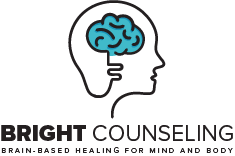Is neurofeedback right for me or my child?
There has been a lot of research on neurofeedback and the disorders it helps with. Neurofeedback has been used for over 50 years and has shown to have many positive results. Neurofeedback has been seen to reduce adhd, anxiety, depression, and learning disorder symptoms with great success. It has also increased focus, concentration, and emotional control in thousnds of subjects. Neurofeedback is FDA approved for relaxation.
Since every person is different, the best first step is to get a Quantitative EEG assessment (brain map) to get a full picture of your brainwave functioning. You will receive results of your assessment with a proposed treatment plan. Neurofeedback is not effective with everyone nor with every condition. We will consult with you to determine if neurofeedback may be effective with you.
For more details about the process of neurofeedback training, visit the ISNR website for an introductory video and research articles on neurofeedback.

What is Neurofeedback training?
Neurofeedback training is self regulation or brain training. The goal is to balance brainwave activity to reduce symptoms of either mental health problems, focus, learning disabilities, or pain. Brainwaves are neurons communicating with each other to provide different functions in our body, when those brainwaves are imbalanced, people experience different problems like depression, anxiety, and adhd. The goal of neurofeedback training is to balance the brainwaves using a natural reinforcement. We place sensors on the person’s head to first assess and analyze the brainwave activity. We then run the information through a database and compare the person’s brainwave activity with normative brainwave activity. We then can train or help the brain condition itself to be more balanced. We do this by using sensors on the head which are and connected to a computer. The person’s positive brainwave activity is then reinforced through sounds and images on the computer screen. The brain understands the reinforcements and the neuron communication changes over time to be more effective and balanced. This process decreases the problematic symptoms of the person.
Are there side effects when doing neurofeedback training?
Neurofeedback is natural and has very few side effects.
Side effects can include poor sleep, dizziness, and slight headaches. Therapists who are trained in Neurofeedback training know how to avoid these side effects.
Who does nuerofeedback work for?
There are many scientific studies and controlled studies on using Neurofeedback as a treatment method for various mental disorders. Neurofeedback has been highly successful in decreasing symptoms of depression, anxiety, panic, sleep disorders, addiction, and adhd. It has been successfully applied in clinical settings for more than 30 years. Business executives and sports athletes have used neurofeedback training to sharpen their concentration and focus.
Are the effects of Neurofeedback long-term?
Studies of long-term effects of Neurofeedback show that the symptoms improve after the first treatment with Neurofeedback and remain stable after the treatment course. Research shows that attention, impulsiveness and hyperactivity further improves after 2-3 months and had remained stable after 2 years.
Neurofeedback trains electrical patterns in the brain and as they are repeated, they become a habit for the brain, so the pattern holds for longer periods of time. After a while, the feedback is no longer needed for the brain to repeat the state it was taught.
Does nuerofeedback send an electrical current in my brain?
No, the sensors can only be used to measure brain activity and sends the signal to the computer through an amplifier. There is a type of neurofeedback training that emits a low level electrical current, the technique is called Low Energy Neurofeedback System (LENS). We do not provide LENS neurofeedback in our practice.
Do I need a referral from my doctor to do neurofeedback training?
You do not need a referral for neurofeedback training. Based on your intake interview and a quantitative eeg assessment (brain-map) a trained therapist will decide whether Neurofeedback is the right method for you. If you are taking a psychotropic medication, we do encourage you to let your prescriber know that you are starting neurofeedback training so they may monitor you for effects of medication toxicity. Since neurofeedback is balancing your brainwaves and increasing brain function, your dosage of medication may need to be decreased over time because your brain is beginning to release the correct amount of dopamine/serotonin, etc. Please consult with your doctor.
Who can do neurofeedback training?
Neurofeedback is a suitable training method for children from the age of 6 years and up through adulthood. Neurofeedback is natural and safe for any person. The only reason why we do not provide neurofeedback training with children younger than 6 is because the national database of “normative brain activity” has only been researched with children 6 and older.
What is At-Home or Remote Neurofeedback Training?
We only provide at-home or remote neurofeedback training. Remote neurofeedback allows you to do neurofeedback training from the comfort of your own home. To begin, we complete a Quantitative EEG Assessment (brain-map) in your home. Our certified provider then evaluates your brain-map and designs a neurofeedback protocol specific to your needs. You will be trained on how to use the rental neurofeedback equipment and you will be monitored by the therapist. The therapist will make tweaks to the protocol and suggest changes as needed through the course of the training sessions.
Training sessions can take place on a home computer, provided there is adequate memory and processing speed. Typically, clients rent the neurofeedback equipment for 2-3 months and successfully complete their neurofeedback at-home training regiment.
Strengthen the brain using neurofeedback
training & other therapy interventions.
Providing Hi-Tech fitness training for the Brain along with therapy for the body, can improve
focus, attention, self confidence, relaxation, greater coping skills, and better sleep.
Schedule an Appointment
